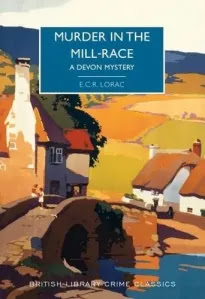China
Court – how can I describe this novel which has overtaken In This House of Brede as my favourite book by this
author? This gem has languished on my shelves until the other day when I
decided I need to be more serious about reading the books I already have. I
joined in with Rose City
Reader’s TBR 23 in ’23 Challenge at the beginning of the
year in order to make some headway on my TBR but I’ve been derailed by the tug
of more book finds. After I’d finished reading China
Court I had a look through some of the other books I’ve had for
a while and was inspired to be more focused on the challenge – I bought these
books for good reasons, after all.
In
This House of Brede, surprised me as it wasn’t really quite what I was
expecting. China Court had the same
effect. Set in Cornwall, it is a novel about five generations of a family. The
story weaves back and forth between generations in the telling, which could be
confusing, but Rumer Godden shows her skill by ignoring some of the niceties of
grammar while keeping continuity and suspense. I loved this book so much that
when it finished I wanted to start it over again – not something I ever do, but
I found it so hard to put the characters, and the house, aside. I re-read parts
and lingered over her beautiful descriptions of people, place, and their
histories, and wondered how I could do the book justice. I can’t, so I apologise
that my ‘review’ isn’t what I would like it to be.
The story focuses on a number of different characters that have been
involved with the Quin family of China Court from around 1840 to 1960. Framing
the novel, and later playing an integral part in the outcome of the story, is a
medieval Book of the Hours. The central character linking the
house and the characters is Mrs Quin, originally an outsider, and her
granddaughter, Tracy.
Old
Mrs Quin died in her sleep in the early hours of an August morning.
The
sound of the bell came into the house, but did not disturb it; it was quite
used to death, and birth, and life.
‘Cause of death, stopped living,’ wrote Dr Taft on the certificate…’
I counted over thirty characters who play significant roles in this
novel and it’s a measure of Godden’s skill that I find I can readily picture
them all. From Eustace and Adza and their brood of nine – the bitter and tragic
Eliza who questioned why she knew so little and was told it was her girls’
school education and followed the advice given her,
’In
this country, at this time, there is only one way to educate a girl…Turn her
loose with books, guide her, but let her read.’
The tragic, arrogant Lady Patrick and her faithless husband, Jared;
beautiful Damaris who pined her short married life away in the city when her
heart was in the Cornish moors; Minna, the young girl so homesick for her
snow-covered Swiss homeland and Groundsel who loved her,
To
Minna, washing up is a thing of beauty…Groundsel, who has seen the other maids
throw everything higgledy-piggledy into the sink, is charmed.
Peter, the young man Mrs Quin came to love almost as a son, believed in
and helped him by letting him use her land of Penbarrow for his farming…‘How could you die?…I was going to surprise you.’ He had harvested
his real crop, built his first hayricks, and at long last started his herd.
Tonight or tomorrow now – ‘’Please God not tonight,’’ said weary Peter – his
first calf would be born: it would be the firstborn, first fruit, and, little
heifer or bull, he had planned to give it to Mrs Quin…The knell that had rung
for Mrs Quinn had run for them all: China Court, Penbarrow, Peter, ‘finished.’
Mrs Quin, or Ripsie, as she was in her youth, was a thin, neglected,
shabby little girl who loved China Court and hovered around on the edges, was
loved and brought into the family by one of its members, ’For him she always has the waif look that tears his heart,
and he knows he is undone.’
Five children were born and then the granddaughter, Tracy, whom Mrs Quin
loved. Circumstances forced her and Tracy apart when Tracy was twelve years of
age and went to America with her mother. Mrs Quin gave Tracy a key to the house
and told her she would come back. Tracy always longed for the home at China
Court. The rest of the family thought the place should be sold. It needed too
many repairs; there was no gas or electricity; looking after the house
was domestic tyranny!
When Mrs Quin died, the family gathered together at China House to hear
the reading of the will and to know the old lady’s wishes. It was said that
both Tracy & Mrs Quin were enslaved by China Court and Tracy was determined
to fight to keep the house if she could.
‘To
keep’ had become for Tracy the most important verb in the English language…It
means to watch over, take care of, maintain.
A stunning
book! I took the photo of my copy of the book with my flowering azalea in full
throttle in the background. I thought it was very in-keeping with Mrs Quin’s
garden.










